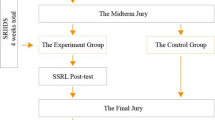Abstract
Metacognition, or the ability to think about thinking, plays a significant role in the performance of first-year design students. Although the number of studies that focus on metacognition has increased in the past decade, additional studies are needed to more fully investigate metacognition and the use of metacognitive strategies in design education. Thus, this study focused on the influence of metacognitive knowledge, monitoring, and control on first-year design students’ performance. The conditions leading to changes in first-year design students’ metacognitive thinking and behaviors were also investigated. The processes of gathering data through concurrent verbalization and retrospective verbalization methods and a questionnaire are described. Thematic data analysis was used to extract the emerging themes from these data sources. Results indicated that metacognitive thinking was present in the generation and development of design ideas. Comparisons of higher- and lower-performing students demonstrated the importance of metacognitive thinking during design learning tasks; higher-performing (HP) students tended to focus more on metacognitive thinking, whereas lower-performing (LP) students focused more on cognitive activities. Other comparisons between HP and LP students, along with recommendations for improving students’ problem solving performance in design courses, are shared.


Similar content being viewed by others
Notes
Noah – Daisy (HP-HP), Steve – Pandora (LP-HP), Autumn – Layla (LP-LP), Linda –Taylor (HP-LP), Paul – Edward (LP-LP), Ava – William – Hana (LP-LP-LP), Nicky – Kara (HP-LP), Catherine – Marie (LP-HP), Bill– Max (HP-LP).
An uncoated, machine-finished paperboard used for technical drawing or model making.
References
Ahmed, S., Wallace, K. M., & Blessing, L. T. (2003). Understanding the differences between how novice and experienced designers approach design tasks. Research in Engineering Design, 14, 1–11.
Alexander, P. A. (2018). Information management versus knowledge building: Implications for learning and assessment in higher education. In O. Zlatkin-Troitschanskaia, M. Toepper, H. A. Pant, C. Lautenbach, & C. Kuhn (Eds.), Assessment of learning outcomes in higher education: Cross national comparisons and perspectives (pp. 43–56). Dordrecht: Springer.
Brown, A. (1987). Metacognition, executive control, self regulation, and mysterious mechanisms. In F. E. Weinert & R. H. Kluwe (Eds.), Metacognition, motivation, and understanding. (pp. 65–117). New Jersey: Erlbaum Hillsdale.
Charmaz, K. (2006). Constructing grounded theory. A practical guide through qualitative analysis. London: Sage.
Clark, R. C. (1988). Metacognition and human performance improvement. Performance Improvement Quarterly, 1, 33–45.
Clark, R. C. (2002). Applying cognitive strategies to instructional design. Performance Improvement, 41(7), 8–14.
Creswell, J. W., & Plano Clark, V. L. (2007). Designing and conducting mixed methods. Thousand Oaks, CA: Sage.
Cross, N. (2004). Expertise in design: an overview. Design Studies, 25(5), 427–441.
Denzin, N. K., & Lincoln, Y. S. (2005). Introduction: The discipline and practice of qualitative research. In N. K. Denzin & Y. S. Lincoln (Eds.), The sage handbook of qualitative research (2nd ed.). CA: Sage, Thousand Oaks.
Desoete, A., & Ozsoy, G. (2009). Introduction: Metacognition, more than the lognes monster? International Electronic Journal of Elementary Education, 2(1), 1–6.
Desoete, A., & Roeyers, H. (2002). Offline metacognition-a domain-specific retardation in young children with learning disabilities. Learning Disability Quarterly, 25, 123–139.
Dunlosky, J., & Metcalfe, J. (2009). Metacognition. Thousand Oaks, CA: Sage.
Efklides, A., & Sideridis, G. D. (2009). Assessing cognitive failures. European Journal of Psychological Assessment, 25, 69–72.
Flavell, J. H. (1976). Metacognitive aspects of problem solving. In L. B. Resnick (Ed.), The nature of intelligence (pp. 231–236). Hillsdale, NJ: Lawrence Erlbaum.
Flavell, J. H. (1979). Metacognition and cognitive monitoring: A new area of cognitive-developmental inquiry. American Psychologist, 34, 906–911.
Flavell, J. H. (1981). Monitoring social cognitive enterprises: Something else that may develop in the area of social cognition. In J. Flavell & L. Ross (Eds.), Social cognitive development (pp. 272–287). New York: Cambridge University Press.
Garner, R. (1988). Metacognition and reading comprehension. Norwood, NJ: Ablex.
Hargrove, R. (2008). Creating creativity in the design studio: Assessing the impact of metacognitive skill development on creative abilities (Doctoral dissertation), North Carolina State University. Retrieved 15 January 2013 from http://www.lib.ncsu.edu/resolver/1840.16/3048. (Accession No. 2010-04-02T18:26:15Z)
Hargrove, R. (2013). Assessing the long-term impact of a metacognitive approach to creative skill development. International Journal of Technology and Design Education, 23(3), 489–517.
Hergenhahn, B. R., & Olson, M. H. (2001). An Introduction to Theories of Learning (6th ed.). New Jersey: Prentice-Hall. Retrieved from https://www.lib.ncsu.edu/resolver/1840.16/3048
Jausovec, N. (1994). Metacognition in creative problem solving. In M. A. Runco (Ed.), Problem finding, problem solving and creativity (pp. 77–95). Norwood, NJ: Ablex Publishing.
Kavousi, S., & Miller, P. A. (2014). The community of practice: Teaching Pedagogy in the Architecture Foundation Design Lab. In EDULEARN14 Proceedings, IATED: 2548–2557.
Kavousi, S. (2017). The Process of Thinking and Making in Beginning Design Students. Doctoral dissertation, Virginia Tech, Virginia, USA.
Kavousi, S., Miller, P. A., & Alexander, P. A. (2020). Modeling metacognition in design thinking and design making. International Journal of Technology and Design Education, 30, 709–735. https://doi.org/10.1007/s10798-019-09521-9
Khaidzir, K. A. M., & Lawson, B. (2013). The cognitive construct of design conversation. Research in Engineering Design, 24, 331–347.
Kirby, J. R., & Ashman, A. F. (1984). Planning skills and mathematics achievement: Implications regarding learning disability. Journal of Psycho Educational Assessment, 2, 9–22.
Ku, S., & Morgan, M. (2006). Technology from a metacognitive perspective in studio settings in the higher education sector. In S. Housego (Ed.), 7th International conference on information technology based higher education and training (pp. 208–216). Sydney NSW: University of Technology Sydney.
Lawanto, O. (2010). Students’ metacognition during an engineering design project. Performance Improvement Quarterly, 23(2), 115–134.
Lawanto, O., Butler, D., Cartier, S., Santoso, H. B., & Goodridge, W. (2013). Task interpretation, cognitive, and metacognitive strategies of higher and lower performers in an engineering design project: An exploratory study of college freshmen. International Journal of Engineering Education, 29(2), 459–475.
Lawson, B. (2006). How designers think: The designing process demystified. London: Architectural Press.
Lee, J., & Shute, V. J. (2010). Personal and social-contextual factors in k-12 academic performance: An integrative perspective on student learning. Educational Psychologist, 45(3), 185–202.
Marchant, G. J. (1989). Meta-teaching: A metaphor for reflective teaching. Education, 109(4), 487–489.
Matanzo, J. B., & Harris, D. L. (1999). Encouraging metacognitive awareness. In J. R. Dugan et al. (Ed.), Advancing the world of literacy: Moving into the 21st-century (pp. 201–225). Carrollton, GA: College Reading Association.
Merriam, S. B. (1998). Qualitative research and case study applications in education. San Francisco, CA: Jossey-Bass Publishers.
Mills, J., Bonner, A., & Francis, K. (2006). The development of constructivist grounded theory. International Journal of Qualitative Methods, 5(1), 1–10.
Nelson, T. O., & Narens, L. (1990). Metamemory: A theoretical framework and new findings. In G. H. Bower (Ed.), The psychology of learning and motivation (Vol. 26, pp. 125–173). New York: Academic Press.
Ormrod, J. E. (2012). Human learning (6th ed.). Boston, MA: Pearson.
Ozsoy, G. (2011). An investigation of the relationship between metacognition and mathematics achievement. Asia Pacific Education, 12, 227–323.
Pesut, D. J. (1984). Metacognition: The Self-Regulation of Creative Thought in Nursing. (published doctoral dissertation), The University of Michigan, Ann Arbor.
Piaget, J. (1973). To understand is to invent: The future of education. New York: Grossman.
Pintrich, P. R., Wolters, C. A., & Baxter, G. P. (2000). Assessing metacognition and self-regulated learning. In G. Schraw & J. C. Impara (Eds.), Issues in the measurement of metacognition (pp. 43–97). Lincoln, NE: Buros.
Rahman, F., & Masrur, R. (2011). Is metacognition a single variable? International Journal of Business and Social Science, 2(5), 135–141.
Reingold, R., Rimor, R., & Kalay, A. (2008). Instructor’s scaffolding in support of student’s metacognition through a teacher education online course: A case study. Journal of Interactive Online Learning, 7(2), 139–151.
Runco, M. A. (Ed.). (1994). Problem finding, problem solving, and creativity. Norwood, NJ: Ablex.
Schön, D. A. (1983). The reflective practitioner. London: Temple-Smith.
Schunk, D. H. (2004). Learning theories: An educational perspective. Pearson NJ: Upper Saddle River.
Simon, H. A. (1969). The sciences of artificial (3rd ed.). Cambridge, MA: MIT Press.
Sternberg, R. J., & Williams, W. M. (1996). How to develop student creativity. Alexandria, VA: Association for Supervision and Curriculum Development.
Teong, S. K. (2002). The effect of metacognitive training on mathematical word-problem solving. Journal of Computer Assisted Learning, 19, 45–46.
von Glasersfeld, E. (1984). An introduction to radical constructivism. In P. Watzlawik (Ed.), The invented reality (pp. 17–40). New York: Norton.
Vygotsky, L. S. (1978). Mind in society: The development of higher psychological processes. Cambridge, MA: Harvard University Press.
Wilson, J., & Clarke, D. (2004). Towards the modelling of mathematical metacognition. Mathematics Education Research Journal., 16(2), 25–48.
Author information
Authors and Affiliations
Corresponding author
Ethics declarations
Conflict of interest
The authors declare that they have no competing interest
Additional information
Publisher's Note
Springer Nature remains neutral with regard to jurisdictional claims in published maps and institutional affiliations.
Appendix A: categories and definitions
Appendix A: categories and definitions
Main categories of metacognitive thought processing.
Category | Definition |
|---|---|
Reflective process knowledge | Learner’s knowledge regarding how to learn, which could influence the process of learning |
Reflective process monitoring | Judgments made by learners regarding the status of learning (how learning is progressing, how learning should progress) |
Reflective process control | Decision or actions taken by learners that influence the progress of the learning-task |
Reflective process knowledge.
Category | Definition |
|---|---|
Reflective process knowledge | Learner’s knowledge regarding how to learn, which could influence the process of learning |
Cognitive strategies knowledge | Thinking about cognition and cognitive strategies |
Self-awareness | Thinking about how learners as individuals learn |
Task-awareness | Thinking about the learning task and how to proceed based on their existing understanding |
Reflective process monitoring.
Category | Definition |
|---|---|
Reflective process monitoring | Learner’s judgment regarding the status of learning (how learning is progressing, how learning should progress) |
Personal feeling monitoring | Learner’s thinking about his/her influential emotional state during the design progress |
Situational actions monitoring | Learner’s thinking about decisions-made or actions taken in the progress of design task |
Reflective process control.
Category | Definition |
|---|---|
Reflective process control | Decisions or actions taken by learners that influence the progress of the design task |
Control of environment | Thinking about what actions to take to control (change/maintain) the physical environment before the start of, or during the design process |
Control of personal feelings | Thinking about what actions to take to change, or maintain emotional state |
Control of situational actions | Thinking about what actions to take to complete/finish the design task |
Physical processing.
Category | Definition |
|---|---|
Physical processing | Learner’s physical feelings and how the physical environment is impacting the learning process |
Affective processing.
Category | Definition |
|---|---|
Affective processing | Learner’s moods, emotions, motivations in relation to the learning task, which could be positive, negative, or neutral |
Rights and permissions
About this article
Cite this article
Kavousi, S., Miller, P.A. & Alexander, P.A. The role of metacognition in the first-year design lab. Education Tech Research Dev 68, 3471–3494 (2020). https://doi.org/10.1007/s11423-020-09848-4
Accepted:
Published:
Issue Date:
DOI: https://doi.org/10.1007/s11423-020-09848-4




